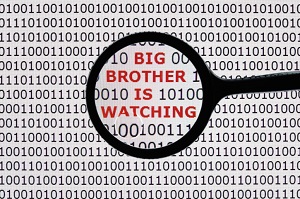 You’re not paranoid if they really are out to get you. More than 50 years after Ernest Hemingway committed suicide, we know that Hemingway was being tracked and hounded by the FBI, but this revelation seems less significant in a culture dominated by surveillance.
You’re not paranoid if they really are out to get you. More than 50 years after Ernest Hemingway committed suicide, we know that Hemingway was being tracked and hounded by the FBI, but this revelation seems less significant in a culture dominated by surveillance.
Edward Snowden’s recent revelations about NSA spying have sparked a vigorous public debate, and employers routinely spy on their employees by tracking their email, logging their chats, and checking their Facebooks. Walk down any street or enter any convenience store and the odds are good that there’s a camera filming you. The line between public and private behavior is increasingly blurred. Some people are willing to sacrifice a bit of privacy to feel safer, but what about the psychological effects of all this surveillance?
Decreased Trust in Government
It makes sense that people might feel more afraid of their government when they think they’re being watched, but the effects go deeper. One study found that when people identified with a leader, their trust in that leader actually decreased when they found out they were being watched. Another study found that people’s willingness to put up with surveillance decreases when they realize that they are the ones being watched instead of a mysterious bad guy.
Increased Stress
A sense of privacy can play a significant role in the control people feel over their lives. We all have private thoughts and behaviors that we’d rather keep under wraps, but mass surveillance makes this much more challenging. A hastily typed email message or unfortunate Facebook update can suddenly become public knowledge. As far back as 1996, researchers found that people felt a loss of control when they knew they were being watched.
The mental health effects don’t end there, though. Researchers have found that as surveillance increases, so does anxiety. Anxiety can lead to a host of health conditions, including high blood pressure, obesity, respiratory problems, gastrointestinal problems, and even cancer.
Effects on Relationships
Social networking, email, and text messaging play major roles in helping to maintain relationships with friends and family, especially across geographic distances. When people know they’re being watched, though, they tend to be more circumspect with their communications. What was once a sarcastic inside joke might become something that, taken out of context, reads like a threat. As the zone of privacy around a relationship diminishes, so too might people’s willingness to foster real intimacy and shared understandings.
Conformity
Researchers have known for decades that people tend to conform to what observers expect. In the 1960s, Stanley Milgram demonstrated that research subjects would willingly shock another person—even to the point of putting the person’s life in danger—if told to do so by an authority figure. When people know they’re being watched, they may subtly alter their behavior and communication to meet the expectations of the watcher. For an office worker, this might mean avoiding creative problem-solving. In political life, though, the effects can be even more damaging. The surveillance efforts of dictatorships have traditionally inhibited public involvement in government and shut down opposition. It may be that even in a democracy, surveillance limits dissent.
References:
- Anxiety and physical illness. (2012, July). Harvard Health Publications. Retrieved from http://www.health.harvard.edu/newsletters/Harvard_Womens_Health_Watch/2008/July/Anxiety_and_physical_illness
- Anxious people more likely to develop aggressive cancer, study finds. (2012, April 26). Metro. Retrieved from http://metro.co.uk/2012/04/26/anxious-people-more-likely-to-develop-aggressive-cancer-study-finds-404181/
- Beaumont, P. (n.d.). Fresh claim over role the FBI played in suicide of Ernest Hemingway. The Guardian. Retrieved from http://www.theguardian.com/books/2011/jul/03/fbi-and-ernest-hemingway
- Borland, J. (2007, August 08). Maybe surveillance is bad, after all. Wired.com. Retrieved from http://www.wired.com/threatlevel/2007/08/maybe-surveilla/
- Smith, M. (1992). Employee stress and health complaints in jobs with and without electronic performance monitoring. Applied Ergonomics, 23(1), 17-27. doi: 10.1016/0003-6870(92)90006-H
- Stanton, J. M., & Barnes-Farrell, J. L. (1996). Effects of electronic performance monitoring on personal control, task satisfaction, and task performance. Journal of Applied Psychology, 81(6), 738-745. doi: 10.1037//0021-9010.81.6.738
- Subašić, E., Reynolds, K. J., Turner, J. C., Veenstra, K. E., & Haslam, S. A. (2011). Leadership, power and the use of surveillance: Implications of shared social identity for leaders’ capacity to influence. The Leadership Quarterly, 22(1), 170-181. doi: 10.1016/j.leaqua.2010.12.014
- York, J. C. (2013, June 25). The chilling effects of surveillance. AlJazeera. Retrieved from http://www.aljazeera.com/indepth/opinion/2013/06/201362574347243214.html

The preceding article was solely written by the author named above. Any views and opinions expressed are not necessarily shared by GoodTherapy.org. Questions or concerns about the preceding article can be directed to the author or posted as a comment below.

 Doomsday Scenarios, Conspiracy Theories, and Psychology
Doomsday Scenarios, Conspiracy Theories, and Psychology The Psychology of So-Called Alien Abductions
The Psychology of So-Called Alien Abductions Prisoners in the Home: How Agoraphobia Can Radically Alter Life
Prisoners in the Home: How Agoraphobia Can Radically Alter Life

Please fill out all required fields to submit your message.
Invalid Email Address.
Please confirm that you are human.
Leave a Comment
By commenting you acknowledge acceptance of GoodTherapy.org's Terms and Conditions of Use.